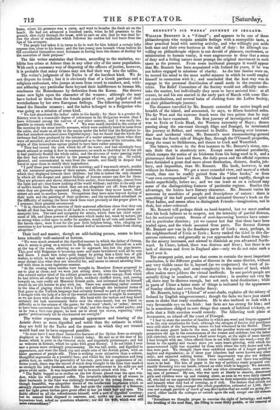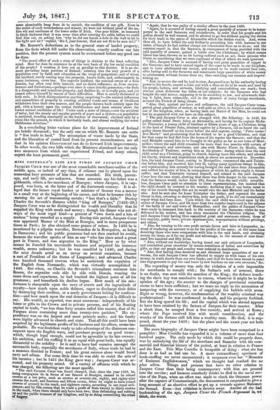BENNETT'S SIX WEEKS' JOURNEY IN IRELAND.
Wumard Bstorwrir is a "Friend"; and appears to be one of those philanthropists who conjoin amiable feelings with a susceptible taste, a clear practical bead with untiring activity, and who willingly put aside both ease and their own business at the call of duty : for although tra- velling on philanthropic objects is not devoid of pleasure, excitement, or ministration to human vanity, it were ungenerous to deny that a sense of duty and a feeling nature must prompt the original movement in such cases as the present. From some incidental passages it would appear that Mr. Bennett has been acquainted with Ireland for years, if he was not before engaged in missions of charity. As the late famine wore on, he turned his mind to the most useful manner in which he could employ himself in connexion with it ; and concluded that the best way was to engage in the personal distribution of small seeds in the remoter dis- tricts. The Relief Committee of the Society would not officially under- take the matter, but individually they seem to have assisted him : at all events, he and his son started in the early part of March with some libe- ral contributions, and several bales of clothing from the Ladies Society, on their philanthropic journey.
The distance travelled by Mr. Bennett extended the entire length and breadth of the island, and amounted, be says, to fifteen hundred miles. The far West and the extreme South were the two points that he may be said to have examined. His first journey of investigation and relief was to Erris or Urria Head, the Western extremity of Mayo; thence passing along the sea-coast through Sligo and Donegal, he terminated the journey at Belfast, and returned to Dublin. Passing over interme- diate and incidental visits, Mr. Bennett's next reconnoitering-ground was from the South side of Dingle Bay, through the O'Connell properties, along the coast to Skibbeieen, and thence to Cork and Waterford.
The letters, written in the first instance to Mr. Bennetes sister, con- tain little that is absolutely new. Except some national peculiarity, which escapes the notice of an Irishman from his being used to it, and a picturesque detail here and there, the daily press and the official reporters have furnished a great deal more about destitution, distress, deaths, job- bery, and imposition, than Mr. Bennett. His book, however, is not without its features. We get a more extended view, and more of .a whole result, than can be readily gained from the "blue books," or front "our own correspondent" at all. The island is spread rapidly, though no doubt superficially, before us and we can trace as on a reduced map some of the distinguishing features of particular regions. Besides this advantage, the letters have literary character. Mr. Bennett varies his accounts by anecdotes of people and descriptions of nature : there is something of the half poetical spirit that animated Gurney's book on the West Indies, and _seems often to distinguish Friends—imagination, not in drab, but sober-coloured.
Mr. Bennett will perhaps think us bard-hearted, but we must confess that his book induces us to suspect, not the intensity of partial distress, but its national extent. Scenes of soul-harrowing horrors have occur- red in particular districts ; yet we cannot but fear that these have been traded upon, and the whole assumed from parts. The fiercest distress Mr. Bennett saw was in the Southern parts of Cork; next, perhaps, in the neighbourhood of Urns or Errs; Kerry ranked the third in this dis- astrous eminence; and generally as you approached the South from Dub- lin the misery increased, and seemed to diminish as you advanced North- ward. In Ulster, indeed, there was distress and fever ; but there is no lack of distress and fever in England also—only we do not raise such a howl over it.
The strangest point, and one that seems to contain the most important conclusion, is the different grades of distress in the same district, without any very visible cause for it, beyond (as we conjecture) the want of in- dustry in the people, and some complexity in the tenure of land, which often makes mere jobbers the virtual landlords. In one parish people are actually dying in numbers, of sheer starvation ; in another not very far oft; there may be distress enough, but not such total destitution ; while in parts of Ulster a better state of things is indicated by the appearance of Sunday clothes and even Sunday finery.
Mr. Bennett, being a "Liberal" of some shade, explains all the misery of Ireland by English misgovernment ; though the facts we have just stated seem to shake that ready conclusion. He is also inclined to look with a very favourable eye on the Irish : but facts are too strong for him; and he is sometimes obliged to note things that smack of habitual trickery, or evils that a little exertion would remedy. The following took place at Arranmore, an island off the coast of Donegal.
"I fear to state the number of families in which fea.weed and limpets appeared to be the only substitutes for food; although the ravages of famine and pestilence were still short of the harrowing scenes we had witnessed in the Mullet. There were the same gaunt looks in the men, and the peculiar worn-out expression of premature old age in the countenances of the women and children; but the latter still clutched, with an eagerness I shall never forget, at the sight of some biscuit I had brought with me, when offered them to eat with their sea-weed,—very dif- ferent to the apathy and vacant stare yet more heart-piercing, with which the unaccustomed sight was regarded by these with whom the very desire and voli- tion were past. We thought there were exhibited marks of a longer period of neglect and degradation; as if these poor islanders had never known any other state, and expected nothing better. Their importunity was also not without rudeness and abuse, when the tickets were extistecl, and there was nothing more to be had. The bits of paper in the way of petitions ready prepared con- stantly thrusting into our hands, evinced an older trade in beggary. We detected, too, instances of exaggeration; and, under any other circumstances, some amus- ing ones of pretence. My son, who was more at liberty to observe, discovered girls and children were up and running about, as soon as we were fairly cleared off, who had on our approach thrown themselves on their miserable sleeping-places, and beneath what they had of covering, as if sick. The feature that struck me most forcibly was, that amongst this tchole population, estimated at 1,500, there was not a single particle of work of any description that we could see going for- ward, either inside the cottages or outside upon the soil, except one old woman knitting. 'Sometimes we thought prow to exercise the right of lecturing; and made the levelling of the mud flow, the filling in some filthy puddle, or the removal of some abominable heap from in to outside, the condition of our gift. Even in the midst of such wretchedness and misery, we were not without proof of the na- tive wit and readiness of the lower order of Irish. One poor fellow, so immured in thick darkness that it was some time after entering his cabin before we could find him out, on asking him why he did not knock a hole in the wall to let in the light and air?' replied, It's I, your honour, that am not fit to be seen in'tl'"
Mr. Bennetes deductions as to the general state of landed property, from the facts which fell under his observation, exactly confirm our late position, that the present system must be overturned before any good can be done.
"The moral effect of such a state of things is obvious to the least reflecting mind. How far does its existence lie at the very basis of the low social condition of the people? I mention it here not as peculiar to this district It is an ele- ment pervading large portions of Ireland; entering into the very growth of a population ever by habit and education on the verge of pauperism; and of whom the landlord, rarely coming near the property, knows little, and, unfortunately in many instances, cares less. The superior landlord, the nominal owner of a wide domain, has often very little interest, and no direct influence; or, from encum- brances and limitations,—perhaps ever since it came into his possession,—he finds it a disagreeable and vexatious property, and dislikes it; or is really poor, and yet cannot relieve himself by reason of these difficulties. Here is society dislocated at both ends. Is Irish disorganization anything surprising ?—the natural influences and expenditure of property in creating artificial wants and means of livelihood withdrawn from their own sources, and the people thrown back entirely upon the soil, with a bounty upon the veriest thriftlessness and least remove above the lowest animal conditions of life! Under such a state of things,—not the accident of today, but the steady and regular growth of years and a system,—a population is nurtured, treading constantly on the borders of starvation; checked only by a crisis like the present, to which it inevitably leads, and almost verifying the worst Malthusian doctrines."
In a concluding letter various plans for the improvement of Ireland are briefly discussed ; but the only one on which Mr. Bennett can settle is "free trade in land." The assumption of waste lands by the State, and the liberation of rented land from its present encumbrances, are all that in his opinion Government can do to forward Irish improvements. In other words' the two bills which the Ministers abandoned are the only two measures from which our experienced Friend, and many others, expect the least permanent good.



























 Previous page
Previous page